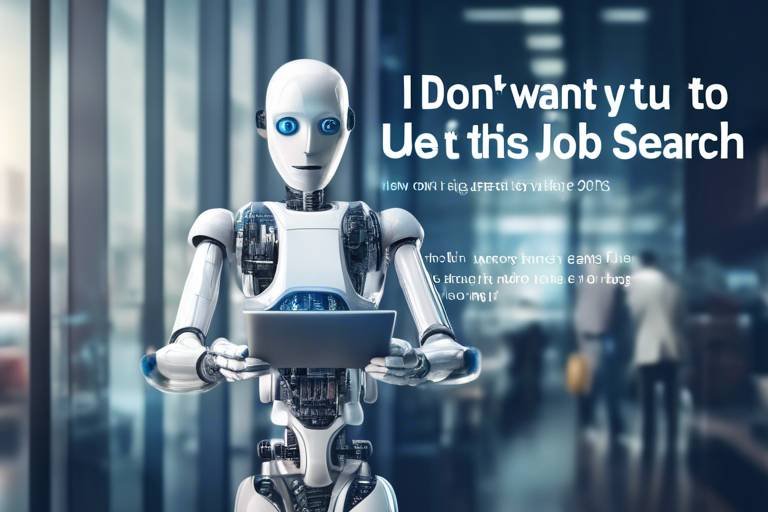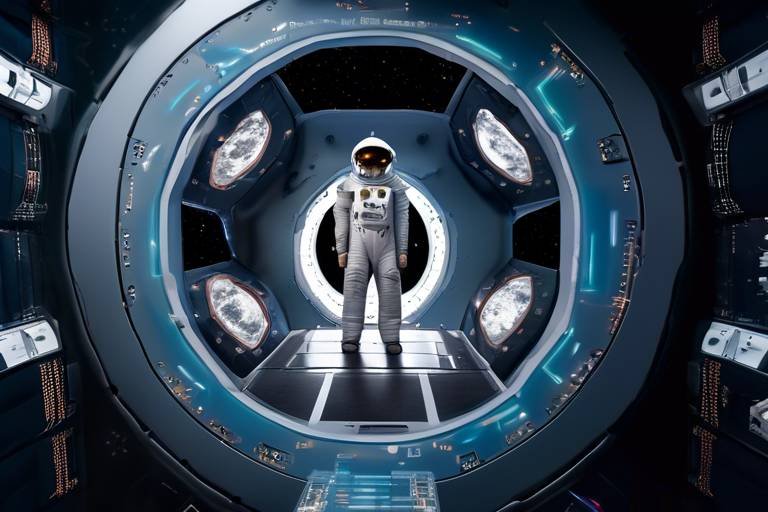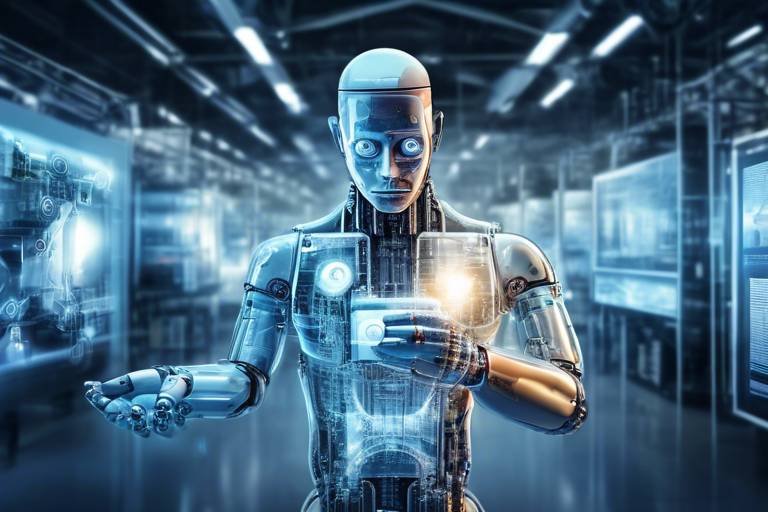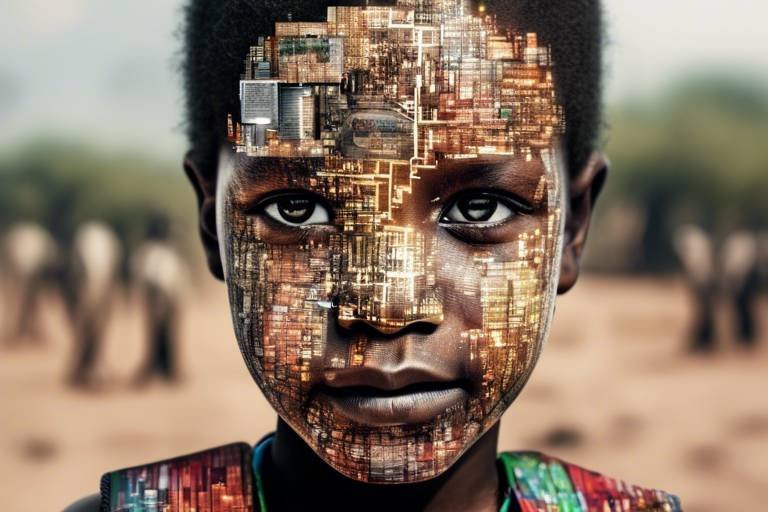How AI Improves Job Search: Current Trends
The world of job searching has undergone a seismic shift in recent years, primarily due to the influx of artificial intelligence (AI) technologies. Gone are the days when candidates would spend hours sifting through job boards, hoping to find a match that suits their skills and aspirations. Today, AI plays a pivotal role in transforming the job search process, making it not only more efficient but also more personalized. Imagine having a digital assistant that understands your unique strengths and preferences, guiding you to opportunities that align perfectly with your career goals. This article explores the transformative role of artificial intelligence in the job search process, highlighting current trends and innovations that enhance candidate experiences and streamline recruitment for employers.
At the heart of AI's impact on job searching is its ability to improve job matching through sophisticated algorithms. These algorithms analyze resumes and job descriptions to enhance the compatibility between candidates and job opportunities. Think of it as a matchmaking service, but instead of finding love, it finds the perfect job for you. By considering various factors such as skills, experience, and even cultural fit, AI ensures that candidates are presented with roles that they are more likely to excel in. This not only leads to better employment outcomes but also increases job satisfaction, as individuals find positions that truly resonate with their career aspirations.
In today's fast-paced job market, employers are inundated with applications. To tackle this overwhelming influx, many companies are turning to AI for resume screening. This innovative approach saves both time and resources, allowing HR teams to focus on candidates who are the best fit for their open positions. AI tools evaluate candidate qualifications by scanning resumes for keywords and relevant experience, filtering applications to identify top contenders. Imagine a world where hiring managers can spend less time wading through stacks of resumes and more time engaging with potential hires. This efficiency not only speeds up the recruitment process but also enhances the overall quality of hires.
One of the key technologies driving AI's effectiveness in recruitment is Natural Language Processing (NLP). NLP enables AI to understand and interpret human language, making it an invaluable tool in the hiring process. For instance, when parsing resumes, NLP can extract relevant information, such as skills and experiences, with remarkable accuracy. This means that candidates can present their qualifications in a way that resonates with employers, increasing their chances of landing an interview. Furthermore, NLP also enhances candidate communication, allowing for more engaging interactions between job seekers and recruiters.
Imagine having a friendly assistant available 24/7 to answer your job-related queries. That's precisely what AI chatbots offer to job seekers. These intelligent bots provide real-time assistance, guiding candidates through the application process and answering common questions. This not only improves candidate engagement but also enhances the overall experience. Candidates feel supported and informed, which can significantly influence their perception of the hiring company. With chatbots handling routine inquiries, recruiters can dedicate more time to building relationships with top talent.
Have you ever wished for a job search that feels tailor-made just for you? With AI, this dream is becoming a reality. AI systems analyze user preferences and behaviors to deliver personalized job recommendations. By considering factors such as past applications, search history, and even user feedback, these systems can suggest roles that align closely with a candidate's skills and interests. This level of personalization not only increases the likelihood of finding suitable positions but also makes the job search feel more intuitive and less overwhelming.
One of the most significant advantages of AI in recruitment is its potential to reduce human biases. Traditional hiring processes can often be influenced by unconscious biases related to gender, ethnicity, or age. However, AI tools are designed to promote diversity and inclusion by focusing on skills and qualifications rather than demographic factors. By standardizing the evaluation process, AI can help create a more equitable hiring landscape, ensuring that all candidates are considered based on their merits rather than external characteristics.
As technology continues to evolve, so too do the applications of AI in job searches. The future promises exciting advancements, particularly in the realm of machine learning. These developments will likely enhance recruitment strategies, making them more efficient and effective. Companies will increasingly rely on AI to analyze vast amounts of data, helping them make informed decisions about hiring and talent management. Moreover, as AI becomes more sophisticated, we can expect to see even more personalized experiences for job seekers, further bridging the gap between candidates and employers.
Imagine stepping into a virtual world where you can experience a job before even applying. The combination of AI and virtual reality (VR) is set to revolutionize job interviews and training. This integration allows candidates to immerse themselves in realistic job scenarios, providing valuable insights into company culture and job expectations. Not only does this enhance candidate assessments, but it also strengthens employer branding, as companies showcase their innovative approaches to recruitment.
While AI offers numerous benefits in the hiring process, it also raises important ethical questions regarding privacy and fairness. As companies adopt AI-driven recruitment practices, it is crucial to prioritize transparency and accountability. Candidates should be informed about how their data is being used and the algorithms that guide hiring decisions. Striking a balance between leveraging technology and maintaining ethical standards will be essential in shaping the future of recruitment.
- How does AI improve job matching? AI analyzes resumes and job descriptions to enhance compatibility, ensuring better employment outcomes.
- What role do chatbots play in the job search process? Chatbots provide real-time assistance to job seekers, improving engagement and the overall application experience.
- Can AI reduce bias in hiring? Yes, AI tools focus on skills and qualifications, promoting diversity and inclusion in the recruitment process.
- What future trends can we expect in AI recruitment? Advancements in machine learning and the integration of AI with virtual reality are anticipated to reshape recruitment strategies.

The Role of AI in Job Matching
In today's fast-paced job market, finding the right position can feel like searching for a needle in a haystack. This is where artificial intelligence (AI) steps in, transforming the job matching process into something more efficient and precise. Imagine having a personal assistant who understands your skills, preferences, and career goals, and who tirelessly sifts through countless job listings to find the perfect matches for you. That's the power of AI in job matching.
AI algorithms are designed to analyze both resumes and job descriptions with remarkable accuracy. By leveraging advanced data analytics, these algorithms can identify key skills, experiences, and qualifications that align with specific job requirements. This results in a more streamlined process that not only benefits job seekers but also assists employers in finding the right candidates more quickly.
One of the key features of AI in job matching is its ability to enhance compatibility between candidates and job opportunities. For instance, when a job seeker uploads their resume, AI systems can cross-reference it against a vast database of job postings, identifying positions that best fit their qualifications. This process is akin to matchmaking in the dating world—AI works to find the right fit based on a variety of factors, including skills, experience, and even cultural fit.
Moreover, AI can continuously learn and adapt. As it processes more data, it refines its understanding of what makes a successful job match. This means that the more candidates and employers engage with the system, the better the AI becomes at recommending opportunities that lead to successful placements. It's a win-win situation that enhances the overall job search experience.
To illustrate the effectiveness of AI in job matching, consider the following table that summarizes its benefits:
| Benefit | Description |
|---|---|
| Improved Accuracy | AI analyzes resumes and job descriptions to match candidates with the most suitable positions. |
| Time Efficiency | Reduces the time spent by both candidates and employers in the job search process. |
| Continuous Learning | AI systems evolve and improve their recommendations based on user interactions. |
| Enhanced Candidate Experience | Job seekers receive personalized job recommendations, increasing their chances of finding suitable positions. |
In conclusion, AI is revolutionizing the job matching landscape by making it more efficient, accurate, and user-friendly. As we continue to embrace technology in our daily lives, the integration of AI into the job search process is not just a trend—it's the future. So, whether you're a job seeker eager to find your dream role or an employer searching for the perfect candidate, AI is here to enhance your experience and increase your chances of success.

AI-Powered Resume Screening
In today's fast-paced job market, the sheer volume of resumes that employers receive can be overwhelming. Imagine sifting through hundreds, if not thousands, of applications for a single position. This is where comes into play, revolutionizing the way employers identify top talent. By leveraging advanced algorithms and machine learning, AI tools can quickly evaluate candidate qualifications, allowing hiring managers to focus on the most promising applicants.
AI resume screening systems analyze various elements of a resume, including keywords, experience, and skills. These systems utilize sophisticated algorithms to match the content of resumes against job descriptions, significantly improving the accuracy of candidate selection. For instance, if a job posting emphasizes the need for proficiency in Python and data analysis, the AI will prioritize resumes that prominently feature these skills. This not only saves time but also enhances the quality of hires by ensuring that only the most relevant candidates make it through to the interview stage.
One of the key benefits of AI-powered resume screening is its ability to eliminate human biases that can inadvertently affect hiring decisions. Traditional screening methods may be influenced by unconscious biases related to a candidate's background or education. However, AI tools focus on objective criteria, such as skills and experience, thereby promoting a more equitable hiring process. This shift towards data-driven decisions helps create a diverse workforce, as candidates are evaluated based solely on their qualifications.
To illustrate the impact of AI on resume screening, let's take a look at a comparison of traditional versus AI-driven methods:
| Aspect | Traditional Resume Screening | AI-Powered Resume Screening |
|---|---|---|
| Time Taken | Hours to days | Minutes to hours |
| Bias | High potential for bias | Minimized bias |
| Candidate Reach | Limited by human capacity | Scalable, can handle thousands of resumes |
| Decision Criteria | Subjective | Objective and data-driven |
As we can see, AI-powered resume screening not only streamlines the hiring process but also fosters a more inclusive environment. However, it's essential to recognize that while AI can enhance efficiency and accuracy, it is not a panacea. Employers must still ensure that their AI tools are designed and trained effectively to avoid perpetuating existing biases. Regular audits and updates to the algorithms can help maintain fairness and transparency in the hiring process.
In conclusion, AI-powered resume screening is transforming the recruitment landscape. By automating the initial stages of candidate evaluation, employers can save time, reduce bias, and ultimately find the right fit for their organizations more efficiently. As technology continues to advance, the integration of AI in recruitment will only become more sophisticated, paving the way for a future where hiring decisions are based on merit and potential rather than subjective judgments.

Natural Language Processing in Recruitment
Natural Language Processing, or NLP, is a groundbreaking technology that is reshaping the recruitment landscape. But what exactly is NLP? In simple terms, it's a branch of artificial intelligence that enables computers to understand, interpret, and generate human language in a valuable way. Imagine having a tool that can sift through thousands of resumes, picking out the most relevant information without breaking a sweat. This is precisely what NLP does for recruiters, making the hiring process not only faster but also more efficient.
The real magic happens when NLP is applied to resume parsing. Traditional methods of reviewing resumes can be tedious and time-consuming. Recruiters often have to wade through mountains of paperwork, searching for keywords and relevant experiences. With NLP, this process becomes a breeze. The algorithms can identify key skills, education, and experience levels by analyzing the language used in resumes. For example, if a candidate mentions "project management" or "data analysis," the system can quickly highlight these skills, allowing recruiters to focus on the most suitable candidates.
Furthermore, NLP enhances communication between candidates and employers. Imagine applying for a job and receiving instant feedback on your application status or having your questions answered in real-time. With AI-driven chatbots powered by NLP, this is becoming a reality. These chatbots can interpret candidate inquiries and provide relevant responses, making the application process smoother and more interactive. This not only saves time for recruiters but also improves the overall candidate experience, making job seekers feel valued and informed.
However, it's essential to recognize that while NLP is a powerful tool, it is not without its challenges. For instance, the effectiveness of NLP systems depends heavily on the quality of data they are trained on. If the data is biased or unrepresentative, the outcomes can be skewed. This is where ethical considerations come into play, emphasizing the need for transparency in the algorithms used in recruitment.
In conclusion, the integration of Natural Language Processing in recruitment is a game-changer. It streamlines the hiring process, enhances candidate engagement, and provides a more personalized experience for job seekers. As this technology continues to evolve, we can expect even more innovative applications that will further transform the way we approach hiring.
- What is Natural Language Processing (NLP)? NLP is a technology that allows computers to understand and interpret human language.
- How does NLP benefit recruiters? NLP helps recruiters parse resumes quickly, identify key skills, and improve communication with candidates.
- Can NLP reduce bias in hiring? While NLP can help reduce bias, it is crucial to ensure that the data used to train these systems is fair and representative.
- Are chatbots effective in recruitment? Yes, chatbots powered by NLP can provide real-time assistance to candidates, enhancing their experience during the application process.

Chatbots for Candidate Engagement
In today’s fast-paced job market, candidate engagement has become a critical factor in recruitment success. Enter AI chatbots—the digital assistants that are transforming how job seekers interact with potential employers. Imagine having a personal assistant available 24/7, ready to answer your questions and guide you through the job application maze. That's precisely what chatbots bring to the table. They provide real-time assistance, ensuring that candidates feel supported and informed every step of the way.
These chatbots are equipped with advanced algorithms that allow them to understand and respond to a wide range of inquiries. For instance, if a candidate has questions about job requirements, the application process, or even company culture, a chatbot can provide instant, accurate responses. This not only saves time for both the job seeker and the recruiter but also enhances the overall candidate experience. The feeling of being heard and supported can significantly boost a candidate’s confidence and interest in a position.
Furthermore, chatbots can streamline the application process by guiding candidates through each step. They can assist with:
- Filling out application forms
- Uploading resumes and cover letters
- Scheduling interviews
This level of engagement keeps candidates informed and reduces the anxiety often associated with job applications. Instead of waiting days for a response, candidates can receive immediate feedback, which is a game changer in today’s competitive landscape.
Moreover, chatbots can gather valuable data on candidate preferences and behaviors. This information can be used to improve recruitment strategies and tailor future interactions. For example, if a chatbot notices that candidates frequently ask about remote work options, employers can adjust their job postings and communication to highlight this feature. This data-driven approach not only enhances the candidate experience but also helps employers attract the right talent.
In summary, AI chatbots are revolutionizing candidate engagement by providing instant support, streamlining processes, and gathering insights that can lead to better recruitment outcomes. They represent a significant step forward in creating a more interactive and responsive hiring environment. As technology continues to advance, we can expect chatbots to become even more sophisticated, further enhancing their role in the job search process.
- What are AI chatbots? - AI chatbots are automated programs designed to simulate conversation with users, providing instant responses to inquiries and assisting with various tasks.
- How do chatbots improve candidate engagement? - They provide real-time assistance, answer questions, and guide candidates through the application process, enhancing their overall experience.
- Can chatbots replace human recruiters? - While chatbots can handle many tasks, they are best used to complement human recruiters rather than replace them entirely.
- What are the benefits of using chatbots in recruitment? - Benefits include saving time, providing immediate feedback, and gathering useful data on candidate preferences.

Personalized Job Recommendations
In today’s fast-paced job market, finding the right position can often feel like searching for a needle in a haystack. This is where come into play, transforming the way job seekers connect with opportunities. Imagine having a personal assistant who not only understands your skills and preferences but also knows the job market inside out. That's the power of AI-driven recommendations!
By leveraging sophisticated algorithms, AI systems analyze a multitude of factors, including your past job searches, application history, and even your online presence. This data is then used to curate a list of job openings that align closely with your profile. In essence, you receive a tailored job search experience that saves you time and increases your chances of landing that dream job. For instance, if you often search for roles in digital marketing, the AI will prioritize similar positions, ensuring you don’t miss out on opportunities that suit your expertise.
Furthermore, these personalized recommendations are not static. They evolve as you interact with the job platform. Each click, application, or even a simple update to your resume feeds back into the system, allowing it to refine its suggestions. This dynamic approach means that the more you engage, the better the recommendations become. It’s like having a friend who learns your preferences over time and always knows what you’ll love!
Additionally, AI systems can analyze job market trends and company needs, ensuring that the recommendations are not only personalized but also relevant to current employment landscapes. For example, if there’s a sudden surge in demand for data analysts in your area, the system will highlight these roles, making sure you’re always in the loop about the hottest opportunities.
To illustrate how this works, let’s take a look at a simple table that summarizes the key benefits of personalized job recommendations:
| Benefit | Description |
|---|---|
| Time-Saving | Reduces the time spent searching for jobs by delivering tailored results. |
| Increased Relevance | Offers job openings that closely match your skills and interests. |
| Adaptive Learning | Continuously improves recommendations based on your interactions. |
| Market Insights | Provides information on trending roles and industries. |
In conclusion, personalized job recommendations powered by AI are revolutionizing the job search process. They offer a customized experience that not only saves time but significantly enhances the likelihood of finding a job that fits your unique profile. So, the next time you’re on a job hunt, remember that with AI at your side, the perfect opportunity might just be a click away!
- How do personalized job recommendations work? - They utilize AI algorithms that analyze your profile, preferences, and market trends to suggest jobs that fit you best.
- Can I modify my preferences for job recommendations? - Yes! Most platforms allow you to update your skills and interests, which helps refine the recommendations.
- Are personalized job recommendations accurate? - They are generally very accurate, as they are based on extensive data analysis, but it's always good to review and explore multiple options.

Bias Reduction in Hiring
In today's increasingly diverse workplace, reducing bias in hiring has become a crucial objective for organizations striving for fairness and equality. Traditional hiring processes often suffer from unconscious biases that can lead to the exclusion of qualified candidates based on factors such as gender, race, or age. However, with the advent of artificial intelligence (AI), there is a promising solution on the horizon. AI tools are designed to focus on skills and qualifications, minimizing the influence of demographic factors that can cloud judgment.
One of the key advantages of AI in recruitment is its ability to analyze vast amounts of data without the emotional biases that humans may bring into the process. For instance, AI can evaluate resumes based purely on qualifications, experience, and skills, rather than personal details that are irrelevant to job performance. This capability not only enhances the fairness of the hiring process but also allows employers to discover talent that might have otherwise been overlooked.
To illustrate this point, consider the following table, which highlights how AI can impact various stages of the hiring process:
| Stage of Hiring | Traditional Approach | AI-Driven Approach |
|---|---|---|
| Resume Screening | Subjective evaluation based on personal biases | Objective analysis focusing on skills and experience |
| Interviewing | Potential bias based on appearance or background | Standardized questions and scoring systems for fairness |
| Decision Making | Influenced by gut feelings or stereotypes | Data-driven insights that prioritize qualifications |
Moreover, AI tools can be programmed to flag any language in job descriptions that may inadvertently deter diverse applicants. By using inclusive language and setting clear, objective criteria for hiring, organizations can attract a broader range of candidates. This proactive approach not only helps in building a diverse workforce but also promotes a culture of inclusion.
However, it's essential to note that while AI has the potential to reduce bias, it is not a one-size-fits-all solution. The algorithms themselves can sometimes inherit biases from the data they are trained on. Therefore, it is crucial for companies to regularly audit their AI systems and ensure they are continually updated to reflect the values of diversity and inclusion. This ongoing evaluation is key to maintaining a fair hiring process.
In conclusion, the integration of AI in recruitment processes represents a significant step towards reducing bias in hiring. By emphasizing qualifications over demographic characteristics, AI not only enhances the candidate experience but also contributes to a more equitable workplace. As organizations continue to adopt these innovative technologies, they pave the way for a future where talent is recognized and valued regardless of background.
- How does AI reduce bias in hiring?
AI reduces bias by focusing on objective criteria such as skills and qualifications, rather than personal attributes that can lead to discrimination. - Can AI completely eliminate bias in hiring?
While AI can significantly reduce bias, it is essential to continuously monitor and update algorithms to ensure fairness and inclusivity. - What are some challenges with using AI in recruitment?
Challenges include the potential for biased algorithms and the need for transparency in how decisions are made. - How can companies ensure their AI hiring tools are fair?
Companies should regularly audit their AI systems and use diverse datasets to train their algorithms.

Future Trends in AI and Job Search
The landscape of job searching is rapidly evolving, and as we look to the future, the integration of artificial intelligence (AI) in recruitment processes is set to become even more sophisticated. One of the most exciting trends on the horizon is the advancement of machine learning algorithms that continuously improve job matching by learning from past hiring decisions and candidate behaviors. Imagine a system that not only suggests jobs based on your resume but also adapts its recommendations as you refine your skills and preferences. This capability could drastically enhance the job seeker experience, making it more personalized and efficient.
Moreover, we are witnessing a significant shift towards the integration of AI with virtual reality (VR). This combination promises to revolutionize how interviews and training sessions are conducted. Picture this: instead of a traditional interview setup, candidates could engage in immersive environments that simulate real workplace scenarios. This not only allows employers to assess candidates in a more dynamic way but also gives candidates a taste of the company culture and job expectations. The potential for enhanced candidate assessments is enormous, leading to better hiring decisions and more satisfied employees.
Another trend to keep an eye on is the growing focus on ethical considerations in AI recruitment. As AI tools become more prevalent, questions surrounding privacy, fairness, and transparency are gaining traction. Companies will need to ensure that their AI systems are designed with accountability in mind. This means implementing measures to prevent bias in hiring processes and ensuring that candidates are aware of how their data is being used. Organizations that prioritize ethical AI practices will not only build trust with candidates but also foster a more inclusive workplace.
Additionally, we can expect AI-driven tools to enhance the way companies engage with potential hires. For instance, AI chatbots could evolve to become even more interactive, capable of conducting preliminary interviews and providing instant feedback. This real-time engagement could significantly improve the candidate experience, making job seekers feel more valued and informed throughout the application process.
In conclusion, the future of AI in job searching is bright and full of possibilities. As technology continues to advance, we can anticipate a job market that is not only more efficient but also more equitable. The integration of machine learning, virtual reality, and ethical considerations will shape recruitment strategies in ways we are just beginning to understand. Keeping up with these trends will be crucial for both job seekers and employers alike, ensuring that they remain competitive in an ever-changing landscape.
- How will AI change the job search process? AI will enhance job matching, streamline resume screening, and improve candidate engagement through personalized recommendations and chatbots.
- What impact will virtual reality have on job interviews? Virtual reality will provide immersive interview experiences, allowing candidates to demonstrate their skills in realistic scenarios.
- How can companies ensure ethical AI practices in recruitment? Companies can implement transparency measures, regularly audit their AI systems for bias, and educate candidates about data usage.
- Will AI replace human recruiters? While AI will automate certain tasks, human recruiters will still play a vital role in assessing candidates and making final hiring decisions.

Integration of AI with Virtual Reality
The integration of Artificial Intelligence (AI) with Virtual Reality (VR) is poised to transform the job search and recruitment landscape in unprecedented ways. Imagine stepping into a virtual environment where you can interact with potential employers, showcase your skills, and even participate in realistic job simulations—all from the comfort of your home. This synergy between AI and VR not only enhances the recruitment process but also provides candidates with a unique opportunity to experience the job in a simulated setting before they even step foot in the office.
One of the most exciting aspects of this integration is the ability to conduct immersive job interviews. Traditional interviews can often feel stiff and formal, making it challenging for candidates to fully express themselves. However, with VR, candidates can engage in more natural and dynamic interactions. For example, an applicant could be placed in a virtual office environment, interacting with a digital avatar of the interviewer, allowing for a more realistic assessment of their fit for the company culture.
Moreover, AI algorithms can analyze the interactions within these virtual settings to provide insights into a candidate's soft skills, such as communication, adaptability, and teamwork. This data can be invaluable for employers looking to hire not just based on technical qualifications but also on interpersonal attributes that are crucial for success in the workplace.
Additionally, the use of VR in training and onboarding processes is gaining traction. New hires can undergo simulations that replicate real-world scenarios they might face in their roles. For instance, a customer service representative could practice handling difficult customer interactions in a virtual environment, receiving instant feedback from AI-driven systems that assess their performance. This not only accelerates the learning curve but also boosts confidence, as candidates can practice in a safe space without the fear of real-world repercussions.
As we look to the future, the potential applications of AI and VR in recruitment are vast. Companies could offer virtual tours of their offices, allowing candidates to get a feel for the work environment before applying. Furthermore, personalized VR experiences could be created based on the candidate's profile, showcasing specific departments or projects that align with their skills and interests.
In summary, the integration of AI with VR is not just a technological advancement; it's a revolution in how we approach job searching and recruitment. It enables a more engaging, efficient, and effective process for both candidates and employers, paving the way for a future where hiring decisions are made with a deeper understanding of a candidate's potential and fit.
- How does AI enhance the recruitment process? AI improves the recruitment process by analyzing resumes, screening candidates, and providing personalized job recommendations, making it faster and more efficient.
- What role does VR play in job interviews? VR creates immersive interview experiences that allow candidates to interact in a realistic environment, helping employers assess both technical and soft skills.
- Can AI reduce bias in hiring? Yes, AI can help reduce biases by focusing on skills and qualifications rather than demographic factors, promoting diversity and inclusion in the workplace.
- What are the future trends in AI and job search? Future trends include advancements in machine learning, integration with VR, and a greater focus on ethical considerations in recruitment practices.

Ethical Considerations in AI Recruitment
As we dive deeper into the transformative world of AI in recruitment, it's crucial to address the ethical considerations that come with it. While AI can streamline processes and enhance efficiency, it also raises significant questions about privacy, fairness, and transparency. Imagine a world where your career opportunities are determined not just by your skills, but by algorithms that may not always be transparent. This scenario highlights the need for a careful examination of how AI is applied in hiring practices.
One of the primary concerns is data privacy. With AI systems analyzing vast amounts of personal data, job seekers may wonder: How is my information being used? It's essential for companies to establish clear guidelines on data collection and usage. Candidates should be informed about what data is being gathered and how it impacts their job search. A lack of transparency can lead to mistrust and may deter talented individuals from applying.
Another critical aspect is the potential for algorithmic bias. AI systems learn from historical data, which may contain inherent biases. If these biases are not addressed, AI can perpetuate discrimination against certain groups. For example, if past hiring practices favored certain demographics, the AI might inadvertently favor candidates who fit that mold. This can undermine efforts to promote diversity and inclusion in the workplace. Organizations must actively work to ensure that their AI tools are designed to minimize bias, focusing on skills and qualifications rather than demographic factors.
Moreover, the lack of accountability in AI decision-making processes raises ethical dilemmas. When a candidate is rejected based on an AI assessment, it can be challenging to understand the reasoning behind that decision. This opacity can lead to frustration and a sense of injustice among job seekers. Companies should strive for explainability in their AI systems, providing candidates with insights into how decisions are made. This not only fosters trust but also allows candidates to improve their applications based on constructive feedback.
To navigate these ethical waters, organizations can consider implementing the following practices:
- Regular Audits: Conduct audits of AI algorithms to identify and rectify biases.
- Transparency Reports: Share information about data usage and AI decision-making processes.
- Candidate Feedback Mechanisms: Create channels for candidates to provide feedback on their experiences with AI systems.
In conclusion, while AI holds immense potential to revolutionize the recruitment landscape, it is imperative that ethical considerations are at the forefront of its implementation. By prioritizing privacy, fairness, and transparency, organizations can harness the power of AI responsibly, ensuring that the job search process remains equitable and accessible for all.
- What are the main ethical concerns regarding AI in recruitment? The primary concerns include data privacy, algorithmic bias, and the lack of transparency in AI decision-making.
- How can organizations ensure fairness in AI recruitment? Organizations can conduct regular audits of their AI systems, implement transparency reports, and establish candidate feedback mechanisms.
- Why is transparency important in AI recruitment? Transparency builds trust with candidates, allowing them to understand how decisions are made and providing them with the opportunity to improve their applications.
Frequently Asked Questions
- How does AI improve job matching?
AI enhances job matching by analyzing resumes and job descriptions using advanced algorithms. This means it can identify the best candidates for specific roles more accurately than traditional methods. By focusing on skills and experience, AI helps ensure that job seekers are matched with opportunities that fit them perfectly, leading to better job satisfaction and retention.
- What role does AI play in resume screening?
AI plays a significant role in resume screening by automating the evaluation process. Employers can save valuable time and resources as AI tools quickly filter through applications to identify the most qualified candidates. This not only speeds up the hiring process but also allows recruiters to focus on engaging with top talent rather than sifting through countless resumes.
- How does Natural Language Processing (NLP) enhance recruitment?
NLP empowers AI to understand and interpret human language, which is crucial in recruitment. It enhances resume parsing, allowing AI to extract relevant information from resumes more effectively. Additionally, NLP improves communication between candidates and employers, making it easier for job seekers to receive personalized responses to their inquiries.
- What benefits do AI chatbots offer to job seekers?
AI chatbots provide real-time assistance to job seekers, answering their questions and guiding them through the application process. This instant support can significantly improve the candidate experience by offering personalized help and reducing the frustration often associated with job applications. Chatbots can also keep candidates engaged and informed throughout the recruitment journey.
- How are personalized job recommendations generated?
AI systems analyze user preferences and behaviors to deliver personalized job recommendations. By considering factors such as previous searches, applications, and interactions, AI can suggest roles that align closely with a job seeker's skills and interests. This tailored approach increases the likelihood of finding a suitable job, making the search process much more efficient.
- Can AI help reduce bias in hiring?
Yes, AI has the potential to reduce human biases in recruitment. By focusing on skills and qualifications rather than demographic factors, AI tools are designed to promote diversity and inclusion. This helps create a more equitable hiring process, allowing candidates to be evaluated based on their merit rather than unconscious biases that may affect human recruiters.
- What future trends can we expect in AI and job searches?
As technology continues to evolve, we can expect exciting advancements in AI and job searches. Future trends may include deeper integration of machine learning algorithms that refine job matching processes and the use of virtual reality (VR) for immersive interview experiences. These innovations will likely enhance both candidate assessments and employer branding, making the recruitment process even more engaging.
- What ethical considerations arise from AI in recruitment?
The use of AI in hiring raises important ethical questions, particularly regarding privacy and fairness. It's crucial for companies to maintain transparency and accountability in their AI-driven recruitment practices. Ensuring that candidates' data is handled responsibly and that AI systems are free from biases will be essential to building trust in these technologies.



















